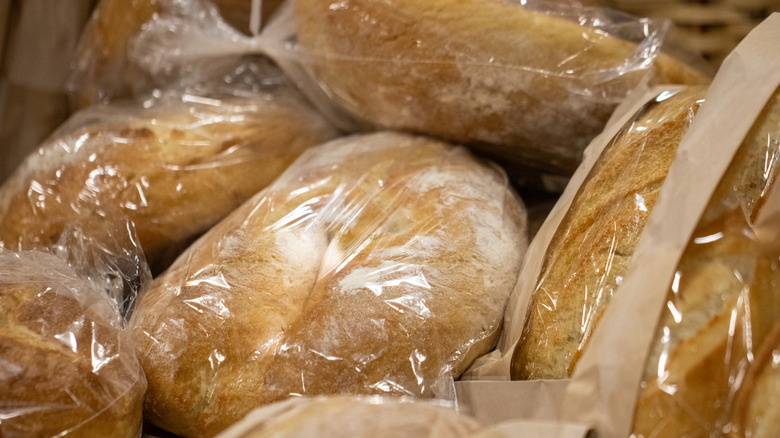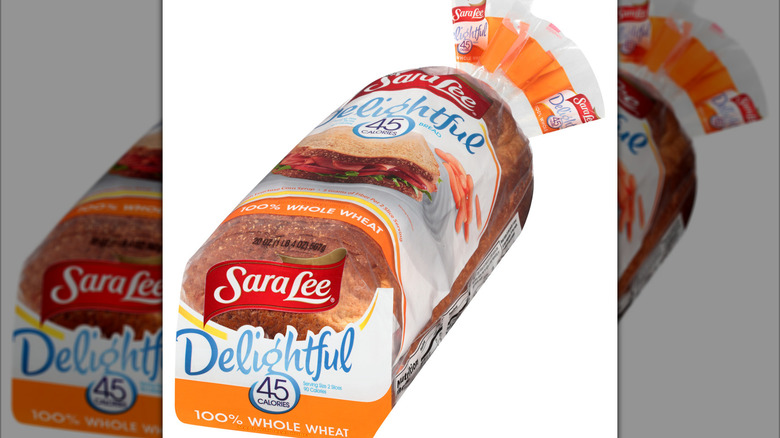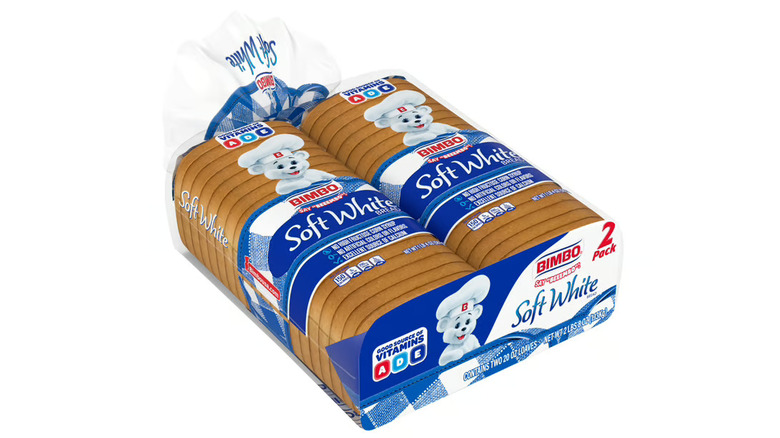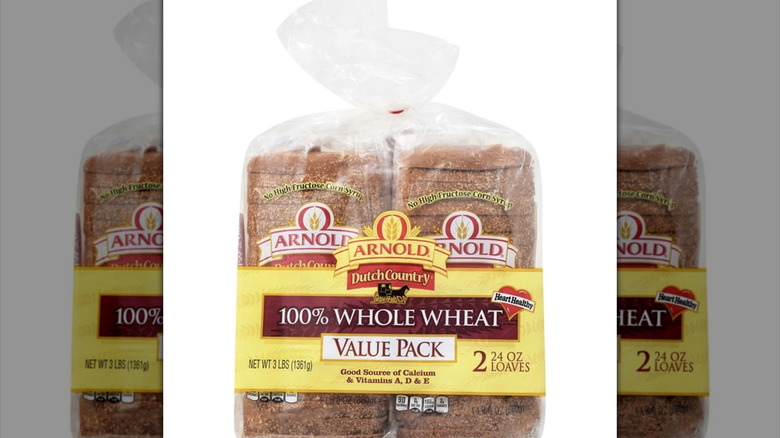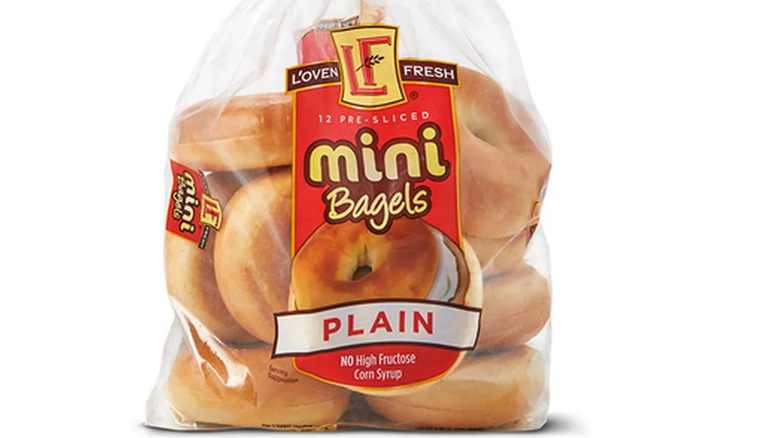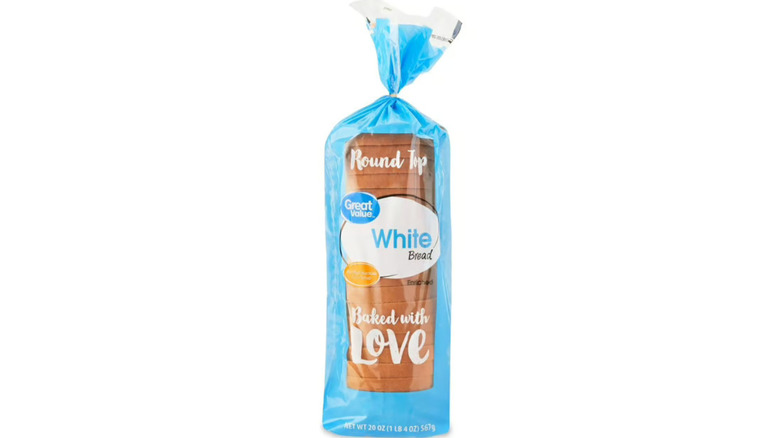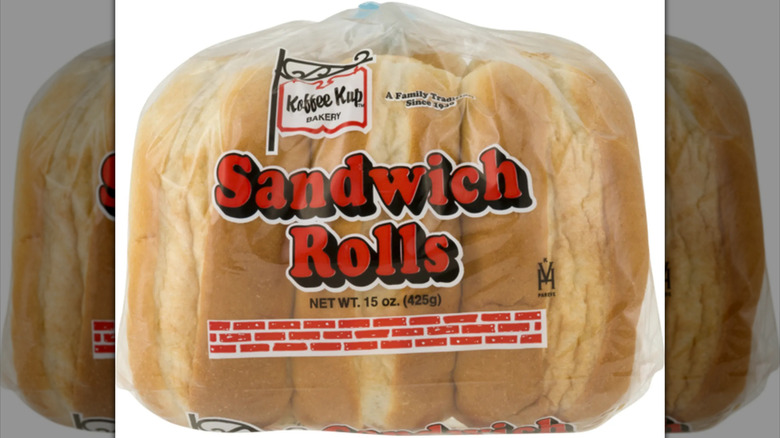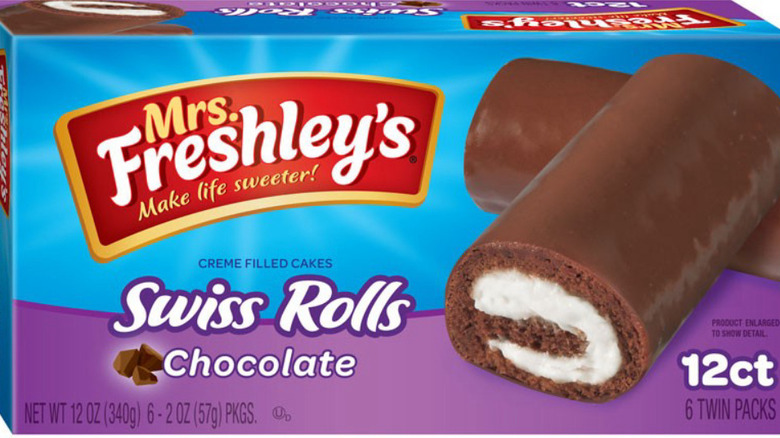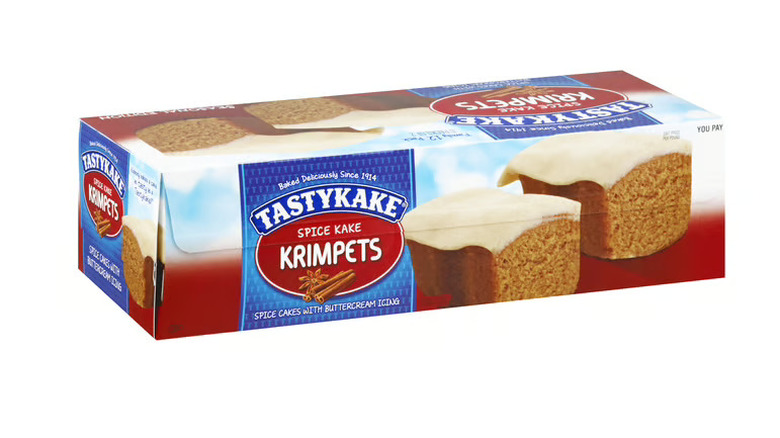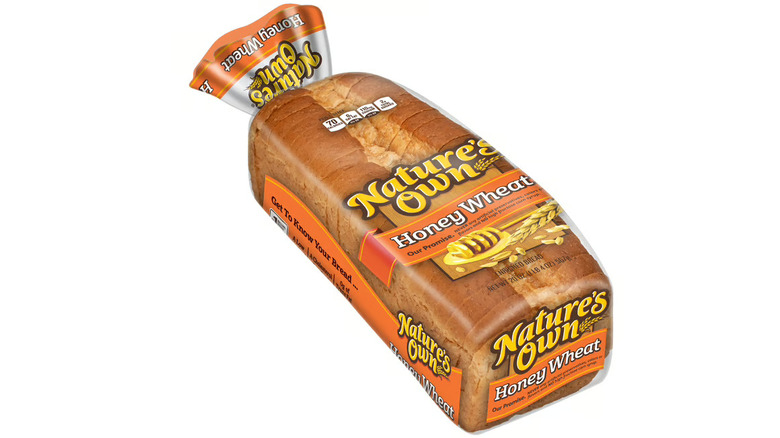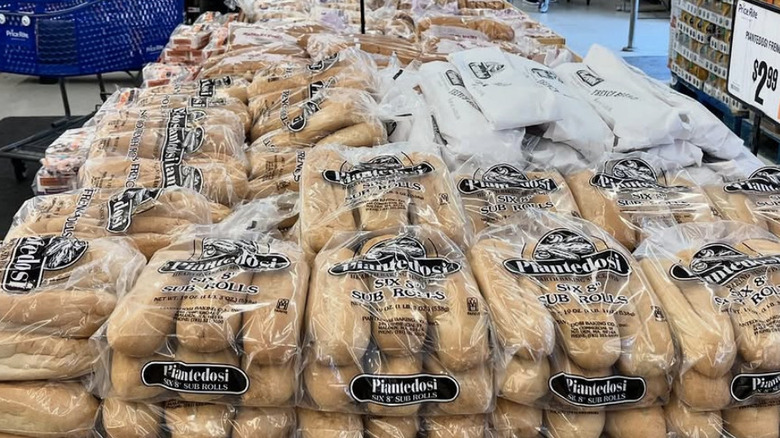The Biggest Bread Recalls In US History
Bread is one of the most versatile food staples on the planet. Not only is a warm fluffy slice of bread divine with a soft pad of butter, but it's the basis of countless delicious concoctions. A deli sandwich stacked sky high with savory slices, a perfectly golden French toast coated in sweet cinnamon sugar, a delightfully aromatic side of garlic bread ... what is there not to love about bread?
Imagine the horror if you bit into your delicately crafted PB&J and a crunch radiated through your jaw as you hit a piece of plastic. This one-sentence horror story is far from fiction. Foreign objects, undeclared allergens, and bacteria can all ruin our favorite foods and cause a mass recall across retailers. Throughout the years, thousands of loaves of bread from your favorite brands have been pulled from American markets for a variety of health concerns. These major recalls will make you want to check your bread twice.
2007 - Sara Lee
Sara Lee is a nationwide brand that stocks the shelves of grocery stores with multiple varieties of fluffy bread. In 2007, the brand put out a warning to consumers and retailers stating that several loaves of bread might contain stray pieces of metal. The size of the metal pieces was unknown, because the brand recalled the items following an internal maintenance request, before customers came into contact with them. The whole grain flour sifter was identified as the culprit of the contamination, after it sustained damage that caused it to shed pieces of metal into the flour processed through it.
Unfortunately, many product recalls originate from customer reports of foreign objects in the food or illness after consumption. Luckily, this recall was voluntary and not due to actual injury. Nevertheless, it resulted in bread from 27 brands being pulled from shelves. At the time, Sara Lee was an independent brand that owned several subsidiaries, including EarthGrains, Publix, and Sara Lee Hearty & Delicious. The contaminated bread was sold in primarily Southern states: Alabama, Arkansas, Florida, Georgia, Louisiana, Mississippi, Missouri, and Tennessee. For unlucky customers who purchased these affected batches of bread, a refund was available at the point of purchase.
2010 - Bimbo Bakeries
Bimbo Bakeries is the parent company to a large number of beloved bread brands, even acquiring the aforementioned Sara Lee in 2010. That same year, the brand had a troubling production slipup. Loaves of bread across several states were sold without warning customers the product contained dairy. For customers without a dairy allergy, this recall was not of any concern, but it was potentially detrimental to those with serious allergies or food sensitivities. The cause of this labeling error was not reported by the brand and did not seem to accompany any sudden change to the product's recipe.
This packing mistake was isolated to just one product (Bimbo Soft White Bread) and did not affect any subsidiary brands. The particular batch of unlabelled bread was distributed to California, Idaho, Oregon, and Washington. Luckily, the brand was able to identify the bungle and issue a recall before any consumers reported illness, hopefully giving people the chance to check their bread before chowing down.
2013 - Bimbo Bakeries
Bimbo Bakeries found itself at the center of another major food recall in 2013. Unfortunately, this recall was not isolated to one brand, but affected multiple subsidiaries of the parent company: Arnold, Aldi, Brownberry, Harmons, Farm Bread, Stroehmann, EarthGrains, and Sara Lee. The company voluntarily recalled the bread after discovering that a faulty mesh screen may have been dropping pieces of flexible wire into baked bread products.
The products in question were spread across all 50 states. This recall reportedly did not affect bread currently being sold in stores, but cautioned that customers should check the "Best By" date on the package to see if their bread was part of the batches recalled. Unfortunately, this means the contamination was discovered a bit too late, and many customers likely purchased and consumed the affected bread. Despite this, there are no reports of injury or illness associated with this recall.
2015 - National Choice Bakery
In 2015, National Choice Bakery announced a massive recall of one of the all time greatest culinary creations: bagels. Originally founded as Twin City Bagel Inc., the company has specialized in the chewy wheels of boiled bread since 1990. This recall affected many brands that sourced bagels from the supplier.
The bagels were recalled due to potential undeclared allergen contamination. In this case, the food was not merely mislabeled, but ingredients that were not intended to be incorporated into the bagels infiltrated the production process. An ingredient supplier had provided the brand with ingredients contaminated with peanuts and tree nuts. Undeclared nut allergens are very dangerous, as unsuspecting customers with these allergies could potentially experience a life threatening reaction.
Grocery store bagel lovers would have been wise to check their bagels as many brands were contaminated. Dan's Pantry, Everyday Essentials, L'Oven, Kroger, Lenders, and Village Hearth bagels were all at risk of containing nuts. Luckily, this was another case of a voluntary recall and no illnesses or injuries were reported in connection to this mishap.
2015 - Bimbo Bakeries
The nation's leading fresh bread vendor was back in the throws of another large scale recall in 2015. Mistakes are bound to happen when overseeing troves of manufacturing plants that bake bread for many widely adored brands. Despite mistakes being inevitable, this recall was particularly frightening.
After a light bulb shattered at a Bimbo Bakeries factory location, glass contaminated the production line. Biting into what should be pillowy slices of bread and being met with an unexpected crunch is downright dangerous. This was almost the case for at least three consumers, who reported seeing glass fragments on the outside of their bread. Luckily, the customers didn't consume any of the bread, and there were no reports of injuries related to this recall.
Bimbo, Great Value, Kroger, L'Oven Fresh, Nature's Harvest, and Sara Lee were all affected by the incident, with the recall spanning 11 states, primarily in the South.
2016 - Koffee Kup
Koffee Kup used to be a Vermont staple, with baked goods sold in gas stations, grocery stores, and convenience stores across New England. Unfortunately, the brand shuttered its doors in 2021, just five years after a large recall.
In 2016, a whopping 99,000 packages of bread products were recalled by the brand because they might contain clear plastic pieces. The plastic bits originated from a larger piece of plastic that found its way on to the production line, shattered, and was possibly baked into bread. This was discovered in a routine screening and was not reported by any customers.
The products recalled spread far and wide in the Northeast and beyond. Vermont, New Hampshire, Maine, Massachusetts, Maryland, Connecticut, Rhode Island, New Jersey, Pennsylvania, New York, Washington D.C., and Virginia were all recipients of these recalled goods. The brand's pastry products seem to be more popular than the bread products, and news coverage at the time reassured customers that the donuts and crullers were made separately from the recalled bread.
2018 - Flowers Foods
Flowers Foods is a longstanding American brand that has grown to be one of the biggest baking companies in the country. Just under 100 years after the company's founding in 1919, the great brand proved fallible when it announced a large recall of its fresh bread products.
This recall was outside of the realm of foreign object contaminants and veered into a territory that is more difficult to detect: bacteria contamination, namely salmonella. The company's whey powder provider flagged the potential contamination in its ingredients and issued the recall. Products from Baker's Treat, Food Lion, Great Value, H-E-B, Mrs. Freshley's, and Market Square were recalled across the entire nation, including bread and sweet treats like Swiss Rolls.
No illness was reported as a result of this recall, though salmonella poisoning can lead to fever and digestion issues. A slice of bread isn't always the obvious culprit when it comes to food poisoning, though, so people may not have made the association.
2021 - Flowers Foods
Flower Foods returned to the recall spotlight just three years after its first widespread recall incident. Although this recall included fewer brands, the two contaminated products were sold across the nation. In this case, the brand's scrumptious snack cakes, Tastykake cupcakes and Krimpets, were recalled due to foreign object contamination.
The grocery store desserts were pulled from shelves after an ingredient supplier informed the brand that products made with its ingredients might contain mesh wiring. Tastykake cupcakes were only sold to eight states, but the Krimpets were peppered across the country. Biting into a delicious loaf of icing piped cake only to discover bit of metal inside would not be a sweet surprise.
No customers reported incidents or injuries from the contamination which is fortunate, especially considering the brand had to amend the original recall from cupcakes to include the affected Krimpets. Swiftly notifying customers of any issues with food products is critical to ensuring health and safety.
2021 - Flowers Foods (again!)
In 2021, Flower Foods once again found itself recalling bread distributed to grocery stores and consumers across the country. This recall was not a typical contamination, but rather a product switcheroo. Flower Foods recalled Nature's Own Honey Wheat bread because in reality, the packages had been wrongly filled with Nature's Own Butterbread. The Butterbread required an allergen warning for the dairy contained in the product, which was consequently missing.
The brand reported that 3,000 loaves of the mismatched bread were sold. Consumers who thought they had purchased Honey Wheat Bread may have noticed something was off about the bread before indulging in a slice. Thankfully, there were no customer reports of illness in connection with the incident.
This silly mix-up could have had dire consequences for consumers with dairy allergies. For the rest, it's still frustrating not to end up with your preferred variety of bread. Regardless of the level of inconvenience, all customers were able to return their mislabeled products for a refund if they wanted.
2022 - Piantedosi
Piantedosi Baking Company is a New England based brand that provides bread to local grocery stores and restaurants, and more widely to nationwide chains. Loaves, rolls, and buns ... this bakery does it all. The brand's 2022 recall also had it all, with several varieties of bread being pulled from shelves and flagged as potentially dangerous.
The recall occurred due to a terrifying food poisoning culprit: Clostridium Botulinum, or more commonly known as, botulism. Another bacteria, Cronobacter sakazakii, was also potentially present in the products. The recall was issued after raw materials from the ingredient supplier Lyons Magnus were used in the creation of these baked delights. Multiple varieties of dinner rolls, sandwich rolls, and buns were affected.
No customers reported illness and the harmful bacteria was not found in any Piantedosi items that were tested, but the brand issued the recall in an abundance of caution. Botulism is a very serious foodborne illness that can lead to muscle paralysis and ultimately death. Cronobacter sakazakii infections are rare but can cause illness in people of all ages, and are particularly deadly for infants. It is better to be safe than sorry when it comes to this dangerous contaminant.
